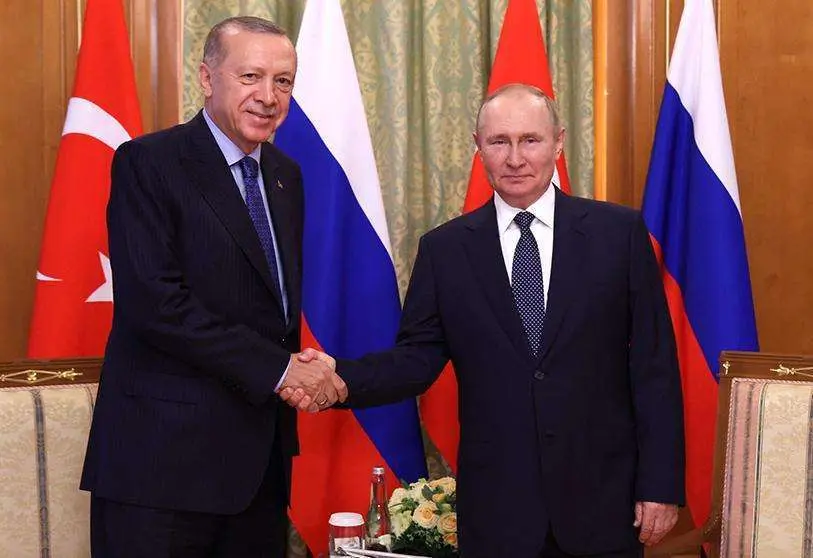Erdogan announces US and Russian commitment not to use nuclear weapons

La reunión de los jefes de los servicios de inteligencia de Estados Unidos y Rusia en Ankara se saldó con el compromiso de no utilizar armas nucleares, al menos por el momento. Así lo anunció el presidente turco, Recep Tayyip Erdogan, quien aseguró que, según información proporcionada por los servicios secretos otomanos, “por ahora, ninguno de nosotros (Rusia y Estados Unidos) intentará utilizar armas nucleares”.
El director de la CIA, William Burns, y su homólogo ruso, Sergey Naryshkin, se reunieron en la capital turca en lo que fue la reunión de más alto nivel desde que Moscú lanzó su invasión de Ucrania a principios de este año. Fahrettin Altun, director de comunicaciones de Turquía, dijo a The Associated Press que la reunión estaba "relacionada con amenazas a la seguridad internacional,A ello hay que sumar las palabras del portavoz del Kremlin, Dmitry Peskov, quien confirmó la reunión y aseguró además que "fue una iniciativa del lado estadounidense".

This first rapprochement has left the compromise on nuclear issues announced by Erdogan, but the intention is that the US and Russian positions will go a step further in the coming weeks. The issue of nuclear disarmament will be addressed in Cairo within the framework of the bilateral commission on the START treaties - agreements between the United States and Russia to reduce their nuclear capabilities - according to Russian Deputy Foreign Minister Sergey Riabkov, who also referred to the meeting between the two countries' top intelligence officials. The meeting "was conducted through the special services. The issues discussed there are of a sensitive nature," said Riabkov.

The START III commission was announced on 9 November by Russian Foreign Ministry spokeswoman Maria Zakharova, who explained that communication with Washington on these agreements had never stopped. Moreover, Zakharova said that this is not a negotiation process, but rather a "practical" and "constant" work being carried out by both parties in order to fulfil the agreements first signed in 1991.
Sergey Riabkov also alluded to the forthcoming meeting on Egyptian territory, in which he said that the list of issues to be discussed is "extensive". He also said he was open to discussing any aspect, assuring that "there are no closed issues, there are no taboos". The Russian side claims to be discussing "in a calm and constructive manner", and hopes that Washington will approach the meeting in the same way. They believe that the West is trying to accuse Moscow of "non-existent intentions" regarding the use of nuclear weapons.

In that vein, the deputy minister says that the use of nuclear weapons could only be possible in two situations: "when an attack is carried out against us or our allies using nuclear weapons or other types of weapons of mass destruction", and a second scenario that would occur "when an act of aggression is carried out against Russia using conventional weapons and the situation has reached a point where the very existence of our state is threatened". He believes that "no matter how firm we stand on this issue, (...) they are trying to impute some non-existent intentions to us, which is just a reflection of the course towards the demonisation of Russia".
The week of 29 November to 6 December will be very important for START III as, following the Russian invasion of Ukraine, talks on the agreement stalled. Now, 266 days after the outbreak of war, the Americans and Russians will once again sit down at a dialogue table where nuclear disarmament will be at the top of the agenda. This is all the more important given Russia's August ban on US inspections of its nuclear weapons arsenal, citing difficulties in doing the same on US soil.

The latest agreement, New START or START III, was extended by US President Joe Biden and his Kremlin counterpart Vladimir Putin in 2021 for the next five years. The memorandum aims to reduce the number of nuclear warheads by 30%, leaving the figure at 1,550 for each country. It also refers to intercontinental ballistic missiles, limited to 700 under this agreement, as well as intercontinental missile launchers, underwater ballistic missile launchers and nuclear-armed strategic bombers at 800.

In addition to the upcoming meeting, Russia has given in despite threats not to renew the agreement allowing for the export of Ukrainian grain. The deadline for renewing this agreement was set for Saturday 19 November and required the unanimous acceptance of Russia, Ukraine, Turkey and the United Nations. However, the Russians seemed reluctant to renew the agreement, arguing that they preferred to wait for the lifting of restrictions on their grain and fertiliser exports, which, although not directly sanctioned, Western companies feared would result in secondary sanctions that would prevent them from trading with Russian exporters.
The renewal of the officially named Black Sea Grain Initiative for the next four months was welcomed by UN Secretary-General Antonio Guterres, quien elogió la prórroga como un acuerdo que "facilita la navegación segura de las exportaciones de cereales, alimentos y fertilizantes desde Ucrania". Además, dice Guterres, “muestra la importancia de la diplomacia tranquila para encontrar soluciones multilaterales”, y, sobre todo, mantiene abierta una de las rutas de exportación más importantes de Ucrania, que permanecerá abierta al menos otros 120 días.
Coordinador de las Américas: José Antonio Sierra.








